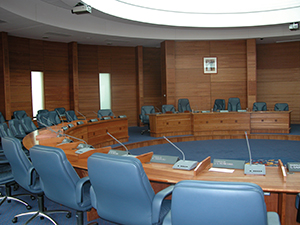Enforcing best behaviour
A year on from the introduction of the Code of Conduct for Councillors, The Northern Ireland Chairman of the National Association of Councillors, Councillor Charlie Casey discusses its implementation.

Introduced last year, the Northern Ireland Local Government Code of Conduct for Councillors provides a new ethical standards framework for councillors. The introduction of the code has been welcomed by the Chairman of the National Association of Councillors, Charlie Casey who notes that it ‘has forced councillors to behave in an appropriate manner.’
The code, issued by the Department of the Environment includes rules on councillors’ general conduct, the registration of interest and the decision making process. It also requires councillors to observe the principles of respect, openness and accountability. Prior to the code’s introduction, councillors had their own interpretation of what was deemed an insult and what was regarded as a light hearted joke between colleagues. However, as Casey notes the introduction of the code has changed that.
“The code now takes that interpretation out of the hands of individual councillors and forces them to behave in the chamber,” states Casey. “Minutes are now properly recorded and reviewed so councillors have to be careful about what they say and do.”
Restrictions
While councillors are entitled to privacy in their personal lives and many of the code’s provision only apply when acting in the role of councillor, there are times when a councillor’s behaviour in their private life can impact upon the reputation and integrity of the council. Specifically, the code applies when a councillor ‘acts, claims to act or gives the impression that they are acting in the role of councillor.’ This clause means a councillor has to be switched on at all times. Using the example of having coffee with his wife in a café, Casey notes how if a customer approaches him to discuss a council matter the code applies. “I have to be switched on every time I cross the threshold of my front door so the code can be intrusive,” Casey admits.
 Casey is also concerned about the code’s requirement for councillors to express their interest in any private club, society or association operating within their council district. He fears this clause may prevent councillors from carrying out duties expected of them by the electorate. “This provision doesn’t stop a councillor from doing their job, what it does have the potential to do is restrict councillors from discussing an issue that may be relevant to their local communities,” states Casey. “In the past we have been lobbied by groups and now we have to declare an interest if that happens. This can be a bad thing as councillors rely on getting elected every four years and if the people who vote for them find them unable to speak up, then they won’t vote for that councillor again,” he adds.
Casey is also concerned about the code’s requirement for councillors to express their interest in any private club, society or association operating within their council district. He fears this clause may prevent councillors from carrying out duties expected of them by the electorate. “This provision doesn’t stop a councillor from doing their job, what it does have the potential to do is restrict councillors from discussing an issue that may be relevant to their local communities,” states Casey. “In the past we have been lobbied by groups and now we have to declare an interest if that happens. This can be a bad thing as councillors rely on getting elected every four years and if the people who vote for them find them unable to speak up, then they won’t vote for that councillor again,” he adds.
The code of conduct gives the Northern Ireland Ombudsman the authority to investigate and where appropriate adjudicate on written allegations that a councillor has, or may have, failed to comply with the code. There is therefore no restriction on who can complain about a councillor’s conduct, nor is there any requirement for a complaint to be made to the relevant council in the first instance. The Ombudsman’s adjudication is final and councillors can only appeal a decision on a point of law.
Casey wants to see a broader right of appeal for councillors and a streamlining of the investigation process. “One of our members had a case brought against them and it took a long time for the verdict to be reached,” Casey says. “In the end, the councillor in question was found not to have broken the code and during the process she couldn’t defend herself. Even after the Ombudsman reached a verdict she still wasn’t allowed to discuss the issue or make anyone aware of the facts of the case. There is no right of appeal except for a costly legal challenge. A resolution panel where a councillor could sit in front of the Chief Executive would be beneficial.”
While Casey is supportive of the concept and principles of the code, he is eagerly anticipating the publication of the review currently being carried out by the Department of the Environment. “The minister has yet to publish the result of the review and it could be that he will now wait until after the election before it is published,” states Casey. “I am happy with the code but I do have some reservations and I look forward to the publication of the review. I intend to study it in-depth and will be able to make a better judgement about the future of the code then.”
More still to do
Ultimately, while the code is a sign of the progress local government is making in relation to its transparency, an investigation by The Irish News highlights the fact there is still some way to go before councillors adhere to its full requirements. In a detailed analysis of council and company records the paper found that hundreds of councillors are failing to declare property and business interests. Widespread issues with the process and oversight of declaring personal interests in general were also discovered.
Each councillor is required to complete declaration of interest forms and submit them to their council. One councillor failed to fully declare an interest in dozens of student lets in south Belfast while another holds directorships in eight different companies that were not disclosed on his declarations of interest form. Many other councillors have vague or incomplete disclosures with one councillor, asked to detail his land and property interests had simply written ‘yes’ on the form. The revelations have prompted Belfast City Council to review its procedures on councillors’ declarations after it could not say when interests were disclosed and many of the documents stored at City Hall in relation to declarations had not been dated or signed by councillors.





